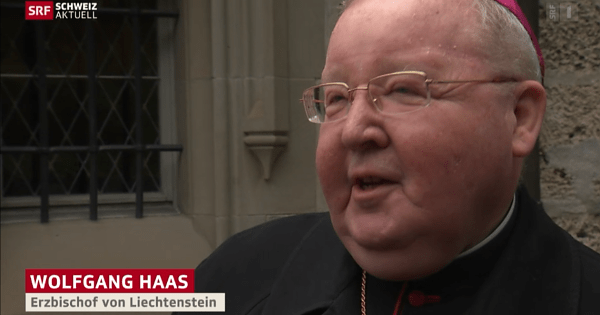The Mass is usually attended by legislators and members of the government. In a statement published in archdiocesan bulletin Vobiscum, Haas lamented that parliament, “all of whose members belong to the Catholic Church,” voted to pass the bill.
“The vast majority of members of parliament transmitted to the government the motion requesting the drafting of a bill, despite, and in contradiction to, the requirements of reason and the law, and therefore voted in favor of the introduction of this pseudo-marriage,” Haas said in the statement.
Same-sex marriage, he said, “runs counter to natural sensibility, to natural law in accordance with reason and, in particular, to the Christian concept of the human being.”
For this reason, he said, “the time has come to give up the so-called ‘ceremony of the Holy Spirit’ for the opening of the sessions of the Landtag, because such a liturgical celebration no longer has any meaning with regard to the parliamentary behavior of the great majority of our Landtag deputies in an essential matter of Christian ethics.”
Haas, 73, is widely known as a conservative prelate known for his controversial positions, including his refusal last year to launch a national synodal consultation process as part of Pope Francis’s multi-year Synod on Synodality, aimed at giving laypeople a more prominent voice and creating a more dialogical church.
In an October 2021 statement, Haas said he did not believe the synodal reflection was necessary for his archdiocese, and that the process risked creating “ideological division” in the church.
Referring to the Vademecum for the Synod on Synodality, an official manual for the process, Haas said the document itself outlines the role of the bishop “as listening” and not engaging “in big discussions and long debates.”
Haas’s decision to cancel the Holy Spirit Mass for parliament comes after a months-long showdown over the bill in which he has repeatedly snubbed politicians associated with the bill and with community Pride celebrations.
Over the summer, he withdrew from a formal dinner appointment with the Mayor of Schaan, Daniel Hilti, over Hilti’s decision to attend the municipality’s very first Pride festival, which was also attended by young Catholics sympathetic to the LGBTQ movement.
It is reportedly a tradition for the parishes of Liechtenstein to invite the mayor to lunch after their confirmation, however, this year Haas bailed due to their “differing ideas” on the Pride celebrations.
Several months later, when parliament met to discuss the Marriage for All bill in September, Haas issued an initial statement lamenting the decision of a majority of PMs to introduce the bill and warned that “such legal institutionalization is unacceptable for the Catholic Church, both for genuine reasons of common sense and for its doctrine of faith based on divine revelation.”
Haas said he had shared publications from the Vatican’s Dicastery for the Doctrine of the Faith on same-sex marriage with parliament, insisting that when it comes time to vote, “the Catholic parliamentarian has the moral duty to express clearly and publicly his opposition and to vote against the bill.”
“Giving voice to such a harmful piece of legislation for the common good of society is a gravely immoral act,” he said.
Parliament passed the motion during a November session, prompting Haas to issue his statement cancelling the Holy Spirit Mass for the opening session of parliament in the new year, saying the vote to draft the bill shows “once again how necessary it is, in terms of religious credibility, to oppose any form of public or institutional ecclesiastical dressing and to avoid it.”
“Experience shows that the consequences of immoral behavior are catastrophic,” he said, saying the introduction of the bill, “with all the excesses that it implies, will lead to breaking of moral barriers, especially in the field of education,” which he said can already be seen in countries where attempts have been made to include so-called gender theory into school curricula.
Haas appealed to the national constitution, saying “the legal assimilation of a life partnership” to the Catholic institution of marriage is “contrary to the Christian foundations in the national constitution of Liechtenstein,” and is therefore unconstitutional.
He closed voicing hope that “on the ground of the new fundamental law of the state, a new salvation and a rich blessing will flourish for my people and my country from the old collaboration between the state and the Church, which has proven itself and which must continue to be cultivated under the protection of God.”
According to the local publication Liechtensteiner Vaterland, the Vatican’s nuncio to Switzerland and Liechtenstein, Archbishop Martin Krebs, has refused to get involved in the standoff, saying it is up to Haas and MPs to resolve the conflict, and that “I see no basis for the Holy See to intervene.”
However, when it comes to the debate, “If someone has a different opinion at the political level, also on LGBTQ issues, then that should be respected,” he said.
Follow Elise Ann Allen on Twitter: @eliseannallen
Source link : https://cruxnow.com/church-in-europe/2023/01/liechtenstein-prelate-cancels-parliamentary-mass-over-gay-marriage-bill/
Author :
Publish date : 2023-01-09 08:00:00
Copyright for syndicated content belongs to the linked Source.
